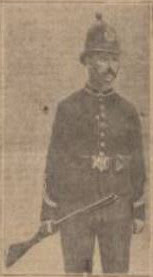Featured
- Get link
- X
- Other Apps
Floods, Chocolate and Intoxicating Liquor: Blandford Forum 1916/17
As I had previously written about annual reports on premises licenced to sell intoxicating liquor in Bridport Divisions. I thought I would look at Grandad Beck's annual report to the Blandford County Licensing Sessions in February 1917. This gives a interesting look at life during World War One.
First I will briefly write about two other cases before the Courts in Blandford Forum. A tale of 5 lads and their quest for chocolate, and one relating to the severe winter weather. Across the country, people suffered from a winter of storms, heavy snow, gales and high tides which bought lots of flooding during the winter of 1916/17.
 |
| Cattle Market possibly at Blandford |
Worst floods for 35 years
In January 1917 there had been flooding in Blandford which lead Mr Augustus Phelps to appear before the magistrates. He was fined for lighting the gas street lamp near his property, in East Street. In the worst flood for 35 years, Mr Phelps considered the 6 inches of water on the pavement to be a hazard and lit the lamp. Unfortunately and unknown to him, under the Defence of the Realm regulations only those authorised could light the lamps. Grandad Beck had lit a few lamps in the area due to the roads being blocked by the flood but didn’t consider this one necessary. Supt. Beck said he was sorry to have to summon Mr. Phelps, but they must not allow people to act indiscriminately.
Chocolate for Washers
In April 1917 Thomas and George Shave, Oliver and John Turner, Harry Blandford, William Neale and Edward Tanswell, all lads from Blandford were in court for stealing chocolate from automatic sweetmeat machines at Blandford rail-way station. Washers and pieces of tin, were used to gain the packets of milk chocolate. Apparently this had been going on for a few months and the boys all pleaded guilty. Thomas Shave, who had supplied the washers, was given three strokes with the birch and a fine of 7s 6d, Harry Blandford, who was too old for the birch (15 years or older), was fined £1. The other lads were fined 5s and bound over to be of good behaviour for 12 months.
Intoxicating Liquor Licences
The report written by Grandad Beck was read out by the Chairman Colonel Parry-Okeden, for the Blandford Police Division. Which included among others, the villages of Milton Abbas, Spetisbury, Stickland, Tarrant Hinton, Winterborne Whitchurch and surrounding areas. In January 1917 there were 34 ale-houses, 6 beer-houses (on-site) and 2 beer-house for consumption off the premises, 7 wine and spirit licenses, 1 spirit dealer's licence. In addition there were 3 registered clubs. It was observed that 7 of the on-site licences were held by women, who's husbands were in the Army or Navy. The court and police agree that all the license could be renewed.
A beer-house was usually a small premises that just sold beer, cider or similar, often brewed on the premises. An ale-house or public house had a full licence which enabled them to sell a wider range including spirits.
Drunkenness
During 1916 there had been 3 men convicted of drunkenness which was a significant decrease from the 29 prosecuted in the year before. This did not include any one serving in the forces at Blandford Camp as these men were dealt with by their officers.
Grandad Beck has spoken to the owners of Langton Arms, Tarrant Monkton and Crown Inn, Tarrant Hinton, about their tenants, as he considered these premises were not properly conducted. In both instances new tenants were appointed and there hadn't been any complaints since.
Cup of Tea
Grandad Beck told the court that a gentleman having asked for and been refused tea in a public-house in this division. All licensees and owners of public-houses had been warned that if a similar instance was reported their license would be opposed by the police. Making licenced houses sell tea and other soft drinks was a measure introduced as the government believed that "high levels of alcohol consumption would have a negative impact on the war effort". The hours that premises were allowed to open had also been restricted in 1914.
Treating
Another measure to reduce alcohol consumption was a “No Treating Order” this stopped someone buying a drink for consumption by anyone other than the purchaser. The Liquor Control Board introduced this in October 1915. In Southampton a man was fined for buying his wife a glass of wine, the wife and barmaid were also fined. Grandad Beck wrote in his report Recently I had reason to believe that the Non-Treating' Regulations of the Liquor Control Board was not being strictly observed in Blandford. He went on to say that he had bought this to the notice of licensees. As they knew they could have their licences taken away and possibly a prison sentence, Grandad Beck was able to report that greater care was now being taken.
All original content by Sylvia Collins is copyright protected.
References Quotes in italics:
The Western Chronicle 1917: Feb 23 p6; Apr 6 p2
Birching: https://en.m.wikipedia.org/wiki/Birching
Liquor Control Board:
http://blog.nationalarchives.gov.uk/blog/pubs-vs-first-world-war/
http://spartacus-educational.com/FWWalcohol.htm
- Get link
- X
- Other Apps
Popular Posts
The Wilfully and Malice Murder of Winifred Mitchell
- Get link
- X
- Other Apps


Comments
Post a Comment